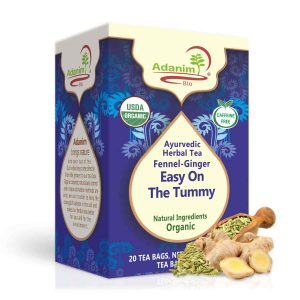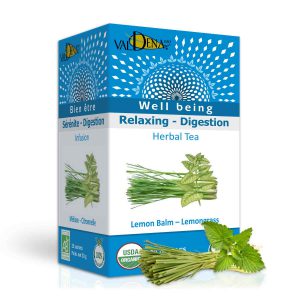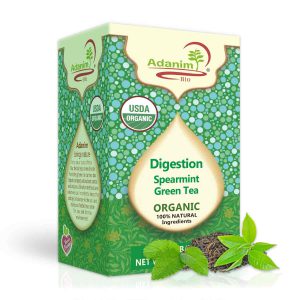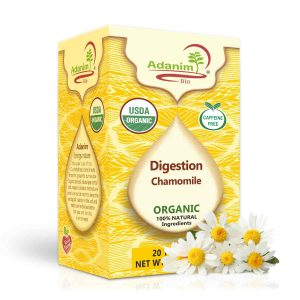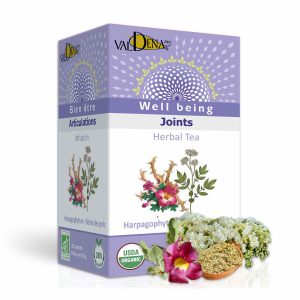6 Best Teas for Stomach Ache – To Relieve Pain Quickly

Stomach ache is a very common ailment that can be caused by a variety of factors, ranging from indigestion to food poisoning. When you have a stomach ache, it can be tough to find relief. However, there’s one drink that is effective in easing intestinal discomfort: Tea.
Unlike some medications that can be harsh on the stomach, tea will not irritate or inflame the digestive system.
6 Best Teas for Stomach Problems (Pain + Ache)
Here we will explore the world of delicious, refreshing teas to find your favorite. We’ll examine what flavors you like and which one suits you best!
- Fennel Ginger Tea for Stomach
- Adanim Bio Organic Fennel Ginger Tea
- Lemon Balm Herbal Tea for Relaxing & Digestion
- Organic Spearmint Green Tea (Non-GMO)
- Chamomile Tea Infusion (A minute till Bedtime)
- Peppermint Tea for Pain Relief
Why Tea Is Best for A Variety of Ailments?
For centuries, people have turned to tea for a variety of ailments. From headaches to upset stomachs, there’s a tea out there that can help. Many teas are thought to be particularly effective at relieving stomach pain quickly.
Amazing Benefits of Tea for Your Stomach and Muscles

Herbal teas like chamomile and ginger have long been used as home remedies for indigestion, and studies have backed up their effectiveness.
The warmth of the tea helps to relax the muscles in the stomach, which can reduce cramping and pain. In addition, the antioxidants in tea can help to speed up the healing process.
If you’re feeling nauseous, ginger tea can also help to settle your stomach. Ginger tea is often recommended as a natural remedy for nausea and vomiting. In addition to being soothing, these teas are also hydrating, which is important when you’re dealing with an upset stomach. So next time you’re feeling uncomfortable, reach for a cup of tea instead of an antacid tablet. You may be surprised at how quickly it helps you feel better.
6 Best Teas for Stomach Ache
1- Best Ginger Tea
(Helps with Bloating, Stomach Pain & Weight Loss)
Ginger tea is a popular remedy for an upset stomach. Made from the root of the ginger plant, this tea is thought to help calm the stomach and ease nausea.
Ginger root has been used medicinally for centuries and is thought to contain compounds that can help settle the stomach. Many people find that ginger tea helps to soothe their stomachs when they are feeling nauseous.
If you are interested in trying ginger tea for an upset stomach, you can get it from our store.
You can sweeten the tea with honey or sugar if you like, but some people find that the taste of ginger is strong enough on its own. Start with small sips and see how your stomach feels.
If you find that ginger tea helps to settle your stomach, you can drink it as needed when you are feeling nauseous. However, be sure to listen to your body and stop drinking it if you start to feel worse. Some people may also experience heartburn after drinking ginger tea. If this happens, try diluting the tea with more water or avoid drinking it on an empty stomach.
2- Best Caffeine-Free Herbal Tea (Easy on the Tummy)
Adanim Bio Organic Fennel Ginger Tea
Fennel has a long history of use as a digestive aid. It is thought to help with bloating, gas, and cramps.
Fennel is also a good source of fiber. Ginger is another well-known digestive aid. It can help to relieve nausea and vomiting. It is also thought to help with gas and bloating. Together, these two herbs make a delicious and effective tea that can help to ease digestive discomfort.
Adanim Bio’s Organic Fennel Ginger Tea is easy on the tummy and caffeine free. It is made with 100% organic ingredients and has a delicate, sweet flavor. This tea is a great way to enjoy the benefits of fennel and ginger without having to compromise on taste or quality.
What are the five benefits of drinking tea?

- Tea is a great source of antioxidants, which can help to protect your cells from damage and may reduce your risk of chronic diseases such as cancer.
- Tea contains less caffeine than coffee, so it can be a good choice if you’re looking for a milder energy boost.
- Tea has been shown to improve mental alertness and memory.
- Tea may help to lower your risk of stroke and heart disease.
- Drinking tea has been linked with a reduced risk of obesity and type 2 diabetes.
3- Best Lemon Balm Herbal Tea for Relaxing & Digestion
Lemon Balm & Lemongrass Organic Herbal Tea
Looking for a delicious herbal tea to help you relax and digest? Look no further than lemon balm tea! This zesty tea is full of health benefits, including improved digestion, reduced anxiety, and even better skin health. Not to mention, it tastes great! Keep reading to learn more about the best lemon balm herbal teas for relaxation and digestion.
There are few things more refreshing than a cup of herbal tea, and lemon balm tea is one of the best options for both relaxation and digestion.
Lemon balm is a perennial herb from the mint family. It’s native to Europe, Africa, and Asia, but it now grows all over the world. The plant has fragrant, lemon-scented leaves that are used to make tea, flavor food, and create cosmetics and medicines.
It is a member of the mint family, and it has a pleasant citrusy aroma. When brewed as a tea, it has a light, slightly sweet flavor. Lemon balm tea can be enjoyed on its own or with a bit of honey.
Lemon balm tea is made by steeping fresh or dried leaves in hot water. It’s thought to have several health benefits, including promoting relaxation and aiding digestion. The herb is known for its calming properties, and it can help to reduce stomach pain stress and anxiety. It also has antioxidant and antibacterial properties, making it good for digestive health. Some people also use it as a natural remedy for anxiety and insomnia.
In addition to its delicious flavor, lemon balm tea offers several health benefits.
When choosing lemon balm tea, look for loose-leaf versions from reputable brands. Avoid teas that contain artificial flavoring or sweeteners.
Brewing the perfect cup of lemon balm tea is simple. Just add 1-2 teaspoons of dried leaves to 8 ounces of boiling water and let steep for 3-5 minutes. For best results, drink the tea freshly brewed. Enjoy up to three cups per day as needed.
4- Organic Spearmint Green Tea (Non-GMO)
Adanim Bio Organic Spearmint Nana Mint Green Tea
(Blend for Digestion Relief and Stomach Ease, Non-GMO, Kosher)
If you’re looking for a delicious and refreshing way to improve your digestion, look no further than Adanim Bio Organic Spearmint Nana Mint Green Tea Blend.
Made with organic spearmint and mint, this tea is designed to help soothe your stomach and ease indigestion. The cooling and refreshing flavor of mint is perfect for sipping after a meal, and the spearmint adds an extra boost of flavor.
Best of all, this tea is Non-GMO and certified by the USDA. So, whether you’re looking for an afternoon pick-me-up or a post-meal digestive aid, Adanim Bio Organic Spearmint Nana Mint Green Tea Blend is a perfect choice.
5- Chamomile Tea Infusion (A minute till Bedtime)
Adanim Bio Organic Premium Chamomile Tea Infusion
Chamomile tea is another popular choice, as it is thought to help relax the muscles in the digestive tract. Chamomile tea, in particular, has been shown to reduce abdominal pain and bloating.
Chamomile Tea, also known as camomile tea, is an infusion made from dried chamomile flowers. Chamomile tea has a bitter, astringent taste and is used as a relaxant.
Chamomile tea infusion is made by steeping chamomile flowers in hot water for 3-5 minutes. The flowers are then removed and the tea is drunk without adding milk or sugar.
Chamomile tea has many health benefits including reducing anxiety and insomnia, relieving indigestion, and reducing inflammation. Chamomile tea can be purchased at most grocery stores and online.
6- Peppermint Tea For Pain Relief
Devil’s claw (Harpagophytum) & Meadowsweet natural herbal Peppermint tea
Drink this energizing herbal tea to feel less pain, and have a better day. Devil’s claw may be used for headaches that come with inflammation or arthritis; it can also help you if your back is hurting from fibromyalgia.
This unique drink has been known as an effective anti-inflammatory agent which will relieve many types of head illnesses including those causing migraines!
Say hello to devil’s claw and meadowsweet, two powerful herbs that work together to create a delicious and effective herbal tea. Devil’s claw is native to southern Africa and has been used for centuries to treat arthritis, joint pain, and inflammation. The active ingredients in devil’s claw are harpagosides, which inhibit the production of inflammatory chemicals in the body.
Meadowsweet is another anti-inflammatory herb that gets its name from the foam that forms on top of meadows when the plant is in bloom. Meadowsweet also contains salicylic acid, the main ingredient in aspirin.
In addition to its anti-inflammatory properties, meadowsweet is also believed to help reduce anxiety and stress. Together, these two herbs make a powerful team that can help to reduce pain, inflammation, and stress. So why not give them a try?
7 Amazing Benefits of Peppermint Tea

- Peppermint tea can help to settle your stomach and relieve nausea.
- It can also help to relieve headaches and tension.
- Peppermint tea is a great way to get your daily dose of antioxidants.
- Peppermint tea can also help to boost your immune system.
- This type of tea can also help to improve your respiratory function.
- Peppermint tea can aid in digestion and help to reduce bloating.
- Finally, peppermint tea can also help you relax and wind down before bedtime.
Frequently Asked Questions About Tea for Stomach Ache
What diseases does tea prevent?
Tea contains antioxidants that help protect cells from damage. These antioxidants may also help lower cholesterol and blood pressure, and improve blood flow. Tea also contains caffeine, which can help increase alertness and reduce the risk of type 2 diabetes.
What tea can cure an infection?
There are a few teas that can lend a helping hand in warding off infection. Herbal teas like ginger, garlic, and turmeric teas are effective in treating infections. Green tea is also beneficial in fighting infection due to its antioxidant and anti-inflammatory properties.
These teas work to promote a healthy immune system, which is key in preventing and fighting infection. So, the next time you feel an infection coming on, reach for one of these teas to help give your immune system a boost.
Can I drink tea every day?
Yes, you can drink tea every day. There are many benefits to drinking tea, including improved mental alertness, increased antioxidants in the body, and lower risks of heart disease and cancer. However, it is important to moderate your intake of tea, as too much can lead to side effects such as insomnia and nausea. When consumed in moderation, drinking tea can be a great way to improve your overall health.
Can tea increase blood pressure?
Yes, tea can increase blood pressure. When we drink tea, the caffeine causes our heart rate to go up and our blood vessels to constrict. This can lead to an increase in blood pressure. The amount of caffeine in tea can vary, so it’s important to know how much caffeine is in your tea before you drink it. If you have high blood pressure, you should limit the amount of caffeine you consume.
Is it okay to drink tea at night?
Most people know that drinking caffeine late at night can make it difficult to sleep. But what about tea? Is it okay to drink tea at night?
Tea contains caffeine, but usually less than coffee. And the caffeine in tea is released more slowly into the bloodstream, so it has a less pronounced effect on sleep.
So if you’re having trouble sleeping, it’s probably best to avoid tea late at night. But if you enjoy a cup of tea before bed, there’s no need to worry. Just be sure to decaffeinate your tea or choose a herbal variety without caffeine such as one of the teas mentioned here.

 Upset stomach
Upset stomach Body Health
Body Health Mental Health
Mental Health Night & Morning
Night & Morning

